-
 Bitcoin
Bitcoin $82,637.2454
-2.03% -
 Ethereum
Ethereum $1,889.9526
-2.49% -
 Tether USDt
Tether USDt $1.0000
-0.01% -
 XRP
XRP $2.2995
-3.74% -
 BNB
BNB $602.4853
-2.74% -
 Solana
Solana $126.3362
-7.03% -
 USDC
USDC $1.0000
0.01% -
 Dogecoin
Dogecoin $0.1685
-4.23% -
 Cardano
Cardano $0.7057
-5.53% -
 TRON
TRON $0.2125
-4.11% -
 Pi
Pi $1.4175
-2.64% -
 UNUS SED LEO
UNUS SED LEO $9.8296
0.19% -
 Chainlink
Chainlink $13.3702
-4.65% -
 Toncoin
Toncoin $3.4436
-3.93% -
 Stellar
Stellar $0.2629
-4.16% -
 Hedera
Hedera $0.1852
-3.85% -
 Shiba Inu
Shiba Inu $0.0...01314
2.47% -
 Avalanche
Avalanche $18.2642
-5.69% -
 Sui
Sui $2.2325
-5.01% -
 Litecoin
Litecoin $90.3407
-2.17% -
 Polkadot
Polkadot $4.3177
-0.73% -
 MANTRA
MANTRA $6.7567
2.01% -
 Bitcoin Cash
Bitcoin Cash $334.0353
-2.43% -
 Ethena USDe
Ethena USDe $0.9997
0.00% -
 Dai
Dai $1.0001
0.01% -
 Bitget Token
Bitget Token $4.3706
-2.25% -
 Hyperliquid
Hyperliquid $12.9689
-9.73% -
 Monero
Monero $209.6067
-1.71% -
 Uniswap
Uniswap $6.1443
-2.04% -
 Aptos
Aptos $5.1531
-3.43%
How to register an Ethereum ETH wallet
Registering an Ethereum wallet entails selecting a cryptocurrency wallet, creating an Ethereum address, securing it with measures such as strong passwords and offline storage, and funding it through transfers or purchases from exchanges.
Dec 19, 2024 at 08:44 am

Key Points:
- Step 1: Choose a Cryptocurrency Wallet
- Step 2: Create an Ethereum Address
- Step 3: Secure Your Ethereum Wallet
- Step 4: Fund Your Ethereum Wallet
- Step 5: Send and Receive Ethereum
How to Register an Ethereum ETH Wallet
Step 1: Choose a Cryptocurrency Wallet
The first step in registering an Ethereum wallet is to choose a cryptocurrency wallet. There are many different types of cryptocurrency wallets available, so it's important to do some research and find one that meets your needs.
Some of the most popular cryptocurrency wallets include:
- Hardware wallets: These are physical devices that store your private keys offline. Hardware wallets are the most secure type of cryptocurrency wallet, but they can be more expensive than other types of wallets.
- Software wallets: These are software programs that store your private keys on your computer or smartphone. Software wallets are less secure than hardware wallets, but they are more convenient.
- Web wallets: These are online wallets that store your private keys on a third-party server. Web wallets are the least secure type of cryptocurrency wallet, but they are also the most convenient.
Step 2: Create an Ethereum Address
Once you have chosen a cryptocurrency wallet, you will need to create an Ethereum address. An Ethereum address is a unique identifier that is used to send and receive Ethereum.
To create an Ethereum address, you will need to follow these steps:
- Open your cryptocurrency wallet software.
- Click on the "Create a new wallet" button.
- Select "Ethereum" as the type of wallet you want to create.
- Enter a strong password for your wallet.
- Click on the "Create Wallet" button.
Your Ethereum address will be displayed on the next screen. You can now use this address to send and receive Ethereum.
Step 3: Secure Your Ethereum Wallet
It is important to secure your Ethereum wallet to protect your funds from hackers and thieves. There are several things you can do to secure your wallet, including:
- Use a strong password. Your password is the first line of defense against hackers. Make sure to choose a strong password that is at least 12 characters long and includes a mix of upper and lower case letters, numbers, and symbols.
- Enable two-factor authentication (2FA). 2FA adds an extra layer of security to your wallet by requiring you to enter a code from your phone or email when you log in.
- Back up your wallet. In the event that your computer or smartphone is lost or stolen, you will need to be able to access your wallet from another device. To back up your wallet, you can create a paper wallet or a mnemonic phrase.
- Store your private keys offline. Your private keys are the most important part of your wallet. If someone gains access to your private keys, they will be able to steal your funds. It is important to store your private keys offline on a hardware wallet or a paper wallet.
Step 4: Fund Your Ethereum Wallet
Once you have secured your Ethereum wallet, you can fund it by sending Ethereum from another wallet or by buying Ethereum from a cryptocurrency exchange.
To send Ethereum from another wallet, you will need to follow these steps:
- Open your cryptocurrency wallet software.
- Click on the "Send" button.
- Enter the recipient's Ethereum address.
- Enter the amount of Ethereum you want to send.
- Click on the "Send" button.
To buy Ethereum from a cryptocurrency exchange, you will need to follow these steps:
Disclaimer:info@kdj.com
The information provided is not trading advice. kdj.com does not assume any responsibility for any investments made based on the information provided in this article. Cryptocurrencies are highly volatile and it is highly recommended that you invest with caution after thorough research!
If you believe that the content used on this website infringes your copyright, please contact us immediately (info@kdj.com) and we will delete it promptly.
- The dog found dead with actor Gene Hackman and his wife, Betsy Arawaka
- 2025-03-17 07:25:56
- Can XRP Price Hit $7? The Truth About Ripple That No One Is Talking About!
- 2025-03-17 06:50:56
- Sleep Token are set for a huge 2025. Download Festival headliners and a brand new album are on the horizon. World domination beckons.
- 2025-03-17 06:45:56
- New crypto presale Meme Index ($MEMEX), has already raised an impressive $4 million
- 2025-03-17 06:45:56
- The Cryptocurrency Market is Heating Up, with Qubetics (TICS), Cosmos (ATOM), Ripple (XRP), and Celestia (TIA) Emerging as Top Picks
- 2025-03-17 06:30:56
- Amidst the Rapid Expansion of the Global Web3 Ecosystem, WebKey Achieves Another Milestone!
- 2025-03-17 06:30:56
Related knowledge
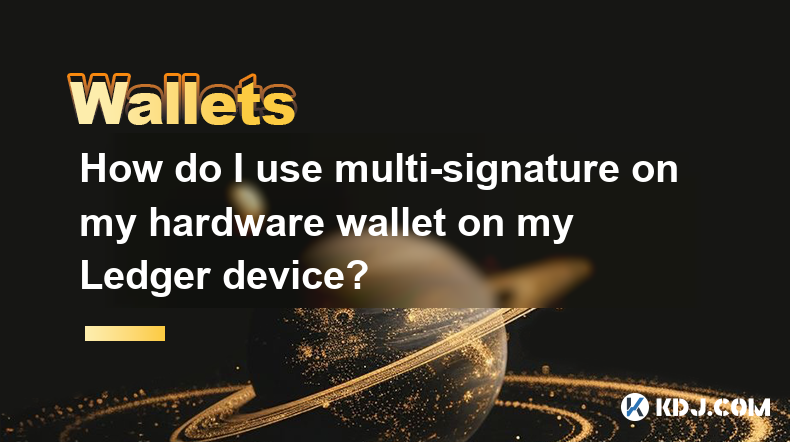
How do I use multi-signature on my hardware wallet on my Ledger device?
Mar 17,2025 at 01:36am
Key Points:Multi-signature (multisig) wallets enhance security by requiring multiple approvals for transactions.Ledger devices support multisig through compatible wallets and specific configurations.Setting up multisig involves generating multiple keys and configuring the wallet accordingly.Understanding the intricacies of threshold signatures is crucia...
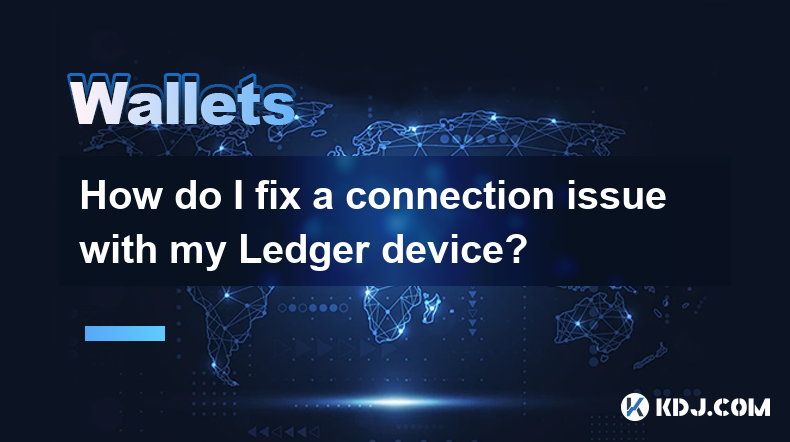
How do I fix a connection issue with my Ledger device?
Mar 16,2025 at 08:26am
Key Points:Troubleshooting Ledger connection issues often involves checking the device's charge, the USB cable, and the computer's USB ports.Software updates on both the Ledger device and its associated computer applications are crucial for optimal functionality and connection stability.Correctly installing the Ledger Live application and ensuring its c...
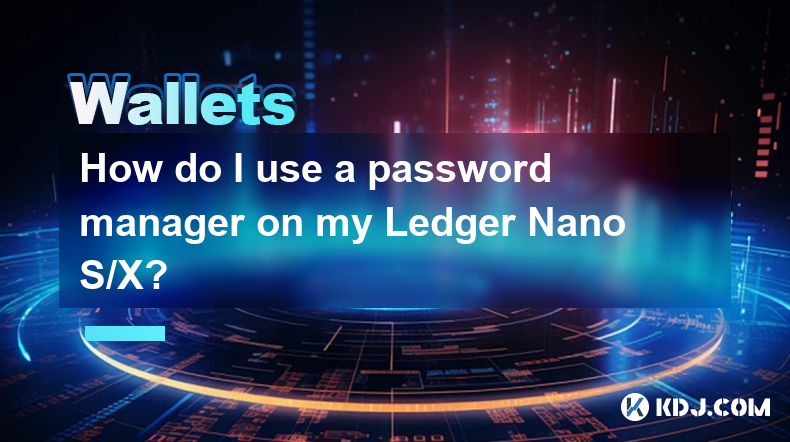
How do I use a password manager on my Ledger Nano S/X?
Mar 16,2025 at 09:25pm
Key Points:Ledger devices do not directly integrate with password managers. Their security model prioritizes offline key storage.You can use a password manager for your computer passwords, but not for your Ledger device seed phrase or PIN.Storing your Ledger PIN in a password manager is highly discouraged due to security risks.Strong, unique PINs and se...
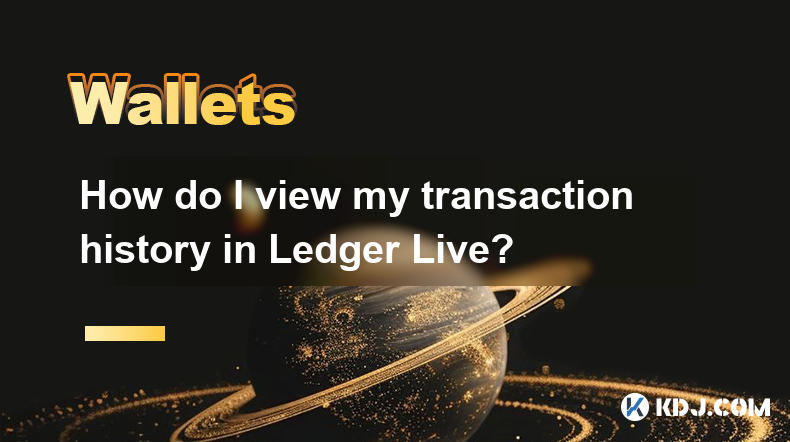
How do I view my transaction history in Ledger Live?
Mar 17,2025 at 01:26am
Key Points:Accessing your transaction history in Ledger Live requires opening the application and selecting the appropriate account.The display of transaction history varies slightly depending on the cryptocurrency.Ledger Live provides various filtering and sorting options to navigate your extensive transaction history efficiently.Troubleshooting steps ...
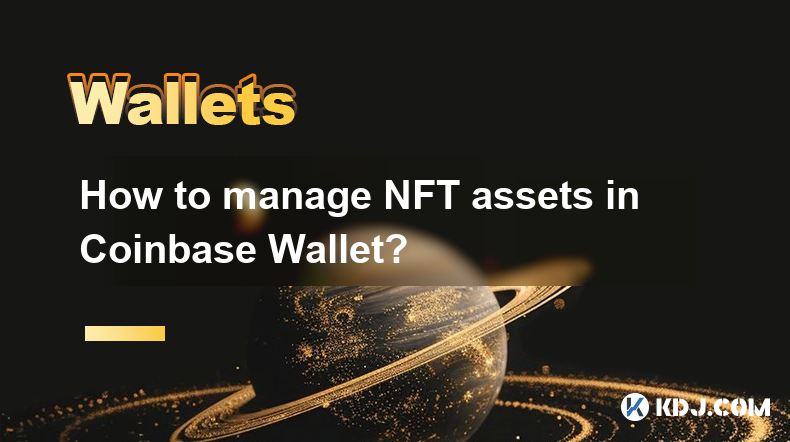
How to manage NFT assets in Coinbase Wallet?
Mar 16,2025 at 11:10pm
Key Points:Coinbase Wallet supports NFT storage and viewing, but not direct trading within the wallet itself.NFTs are managed through your wallet's connection to the blockchain.Security best practices are crucial for protecting your NFT assets.Understanding gas fees is essential for interacting with your NFTs.Different blockchains require different appr...
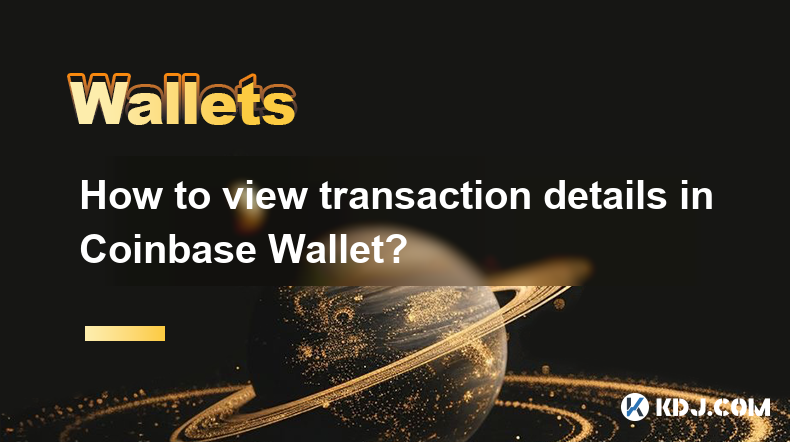
How to view transaction details in Coinbase Wallet?
Mar 16,2025 at 06:45am
Key Points:Coinbase Wallet offers multiple ways to view transaction details, depending on the type of transaction (e.g., sending, receiving, swapping).Accessing transaction history requires navigating to the wallet's history section.Detailed information, including timestamps, amounts, gas fees, and transaction IDs, is available for each transaction.Trou...

How do I use multi-signature on my hardware wallet on my Ledger device?
Mar 17,2025 at 01:36am
Key Points:Multi-signature (multisig) wallets enhance security by requiring multiple approvals for transactions.Ledger devices support multisig through compatible wallets and specific configurations.Setting up multisig involves generating multiple keys and configuring the wallet accordingly.Understanding the intricacies of threshold signatures is crucia...

How do I fix a connection issue with my Ledger device?
Mar 16,2025 at 08:26am
Key Points:Troubleshooting Ledger connection issues often involves checking the device's charge, the USB cable, and the computer's USB ports.Software updates on both the Ledger device and its associated computer applications are crucial for optimal functionality and connection stability.Correctly installing the Ledger Live application and ensuring its c...

How do I use a password manager on my Ledger Nano S/X?
Mar 16,2025 at 09:25pm
Key Points:Ledger devices do not directly integrate with password managers. Their security model prioritizes offline key storage.You can use a password manager for your computer passwords, but not for your Ledger device seed phrase or PIN.Storing your Ledger PIN in a password manager is highly discouraged due to security risks.Strong, unique PINs and se...

How do I view my transaction history in Ledger Live?
Mar 17,2025 at 01:26am
Key Points:Accessing your transaction history in Ledger Live requires opening the application and selecting the appropriate account.The display of transaction history varies slightly depending on the cryptocurrency.Ledger Live provides various filtering and sorting options to navigate your extensive transaction history efficiently.Troubleshooting steps ...

How to manage NFT assets in Coinbase Wallet?
Mar 16,2025 at 11:10pm
Key Points:Coinbase Wallet supports NFT storage and viewing, but not direct trading within the wallet itself.NFTs are managed through your wallet's connection to the blockchain.Security best practices are crucial for protecting your NFT assets.Understanding gas fees is essential for interacting with your NFTs.Different blockchains require different appr...

How to view transaction details in Coinbase Wallet?
Mar 16,2025 at 06:45am
Key Points:Coinbase Wallet offers multiple ways to view transaction details, depending on the type of transaction (e.g., sending, receiving, swapping).Accessing transaction history requires navigating to the wallet's history section.Detailed information, including timestamps, amounts, gas fees, and transaction IDs, is available for each transaction.Trou...
See all articles























































































